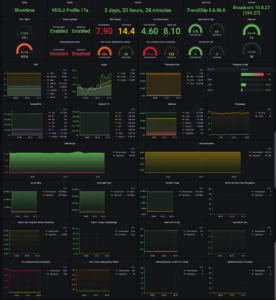In a world dominated by social media, podcasts, and video content, one might wonder: is blogging still relevant? It’s a fair question given the rapid evolution of digital communication. However, beneath the surface clutter of trending platforms lies an enduring medium that continues to captivate audiences around the globe.
Blogging isn’t just about sharing thoughts or opinions anymore; it has transformed into an influential tool for businesses, creators, and everyday people looking to make their mark. From personal experiences to in-depth analyses on niche topics, blogs remain a cornerstone of online expression. As we dive deeper into this topic, you’ll discover how blogging adapts and thrives amid changing landscapes. So grab your favorite beverage—let’s explore whether blogging holds its ground in today’s fast-paced digital age!
The History and Evolution of Blogging
Blogging began in the late 1990s when individuals started creating personal online journals. Early platforms like LiveJournal and Blogger allowed users to share thoughts with a few clicks, paving the way for widespread digital storytelling.
As technology advanced, so did blogging. The introduction of user-friendly content management systems made it easier for anyone to start a blog without needing coding skills. This democratization of content creation sparked a surge of diverse voices online.
By the early 2000s, blogs transitioned from mere diaries to influential publications. They became essential tools for businesses and marketers looking to engage audiences and boost SEO rankings.
The rise of social media further transformed blogging. Platforms like Facebook and Twitter integrated microblogging features, shifting how people consume content. Yet despite these changes, traditional blogs persist as valuable resources—each one contributing uniquely to the vast tapestry of information available today.
Benefits of Blogging
Blogging offers a unique platform for self-expression. It allows individuals to share their thoughts, passions, and experiences with a global audience.
One significant benefit is the opportunity to build an online presence. This visibility can lead to networking opportunities and collaborations that might not have been possible otherwise.
Moreover, blogging enhances writing skills. Regularly crafting posts hones your ability to articulate ideas clearly and effectively.
For those looking to establish authority in their niche, blogging provides a way to showcase expertise. Sharing valuable insights helps readers see you as a trusted source of information.
Additionally, blogs foster community engagement. Readers often leave comments or share posts on social media, creating dialogue around topics that matter most to them.
Consistent blogging can drive traffic to websites or businesses. Engaging content attracts visitors who are more likely interested in what you offer.
Challenges Facing Bloggers in Today’s World
Blogging has become a crowded space. With millions of blogs online, standing out is a constant challenge for creators. Differentiating oneself requires unique content and voice.
SEO algorithms are ever-changing. Keeping up with these updates can be daunting. Bloggers must continuously adapt their strategies to remain visible in search results.
Engagement is another hurdle. Readers often have short attention spans and countless options at their fingertips. Capturing and maintaining interest demands creativity and persistence.
Monetization poses its own set of difficulties as well. Many bloggers struggle to turn passion into profit, especially when relying on ad revenue or affiliate marketing alone.
Mental health impacts can’t be ignored. The pressure to create consistently can lead to burnout, making it tough for bloggers to stay motivated over time amidst the noise of social media metrics and audience expectations.
How to Make Your Blog Stand Out
To make your blog stand out, focus on your unique voice. Authenticity attracts readers looking for genuine perspectives. Don’t shy away from sharing personal stories or insights that resonate with your audience.
Visual appeal matters too. Use striking images and clean layouts to create an inviting experience. Infographics can simplify complex information while enhancing engagement.
Engage with your readers through interactive content like polls or quizzes. This not only encourages participation but also builds a community around your blog.
Consistency is key; however, vary the types of posts you publish. Mix tutorials, opinion pieces, and listicles to keep things fresh.
Leverage social media platforms effectively to promote new content and connect with followers directly. The more authentic interactions you have, the stronger your blog’s presence becomes in a crowded online space.
Monetization Strategies for Bloggers
Monetizing a blog can open up exciting avenues for income. There are several strategies bloggers can employ to turn their passion into profit.
Affiliate marketing is one popular option. By promoting products or services, bloggers earn commissions on sales generated through their unique links. It’s an excellent way to integrate recommendations naturally within content.
Sponsored posts provide another revenue stream. Brands often seek bloggers whose audiences align with their target market, offering payment for writing promotional articles or reviews.
Ad networks like Google AdSense allow bloggers to display ads directly on their site. This passive income method requires minimal effort once set up, making it appealing for busy creators.
Selling digital products—like eBooks, courses, or printables—is also effective. It not only generates income but establishes authority in a niche.
Membership sites and subscription models invite loyal readers to support the blog while gaining access to exclusive content or perks, fostering community engagement alongside monetization efforts.
The Future of Blogging: Trends to Watch Out For
The landscape of blogging is evolving rapidly. Visual content is becoming increasingly crucial, with platforms prioritizing images and videos. Bloggers must adapt by incorporating multimedia elements to engage audiences effectively.
Another trend on the rise is niche specialization. As competition intensifies, finding a unique voice or topic can set bloggers apart. Audiences today crave authenticity and expertise.
SEO practices are also shifting. With search engines emphasizing user experience, optimizing for mobile devices and page speed will be essential for maintaining visibility.
Social media integration continues to play a vital role in driving traffic to blogs. Leveraging these platforms can enhance reach and audience interaction.
Emerging technologies like AI are reshaping content creation as well. Tools that assist with writing or keyword analysis can streamline processes but require careful use to maintain originality and tone.
Staying informed about these trends will help bloggers thrive in this dynamic environment.
Conclusion: The Importance of Blogging in the Digital Age
Blogging remains a vital part of the digital landscape, even as trends shift and new platforms emerge. It serves as a powerful medium for self-expression, knowledge sharing, and building community. The ability to connect with diverse audiences is unparalleled.
The relevance of blogging extends beyond mere personal expression; it can play an integral role in marketing strategies, helping businesses build credibility and foster relationships with customers.
As we dive deeper into the complexities of online communication, blogs provide authenticity that social media often lacks. They offer long-form content where ideas can be explored in depth without character limits or fleeting timelines.
While challenges like saturation and changing algorithms exist, they are not insurmountable. Adaptation is key for bloggers looking to thrive today. By focusing on quality content, engaging storytelling, and niche expertise, individuals can carve out their own space in this ever-evolving environment.
With advancements in technology continuing to shape how we consume information—be it through voice search or AI-driven recommendations—the possibilities for bloggers are limitless. Embracing these changes while staying true to one’s unique voice will ensure that blogging remains relevant well into the future.
The importance of blogging lies not just in its current status but also in its potential for connection and growth—both personally and professionally—in our increasingly digital world.




